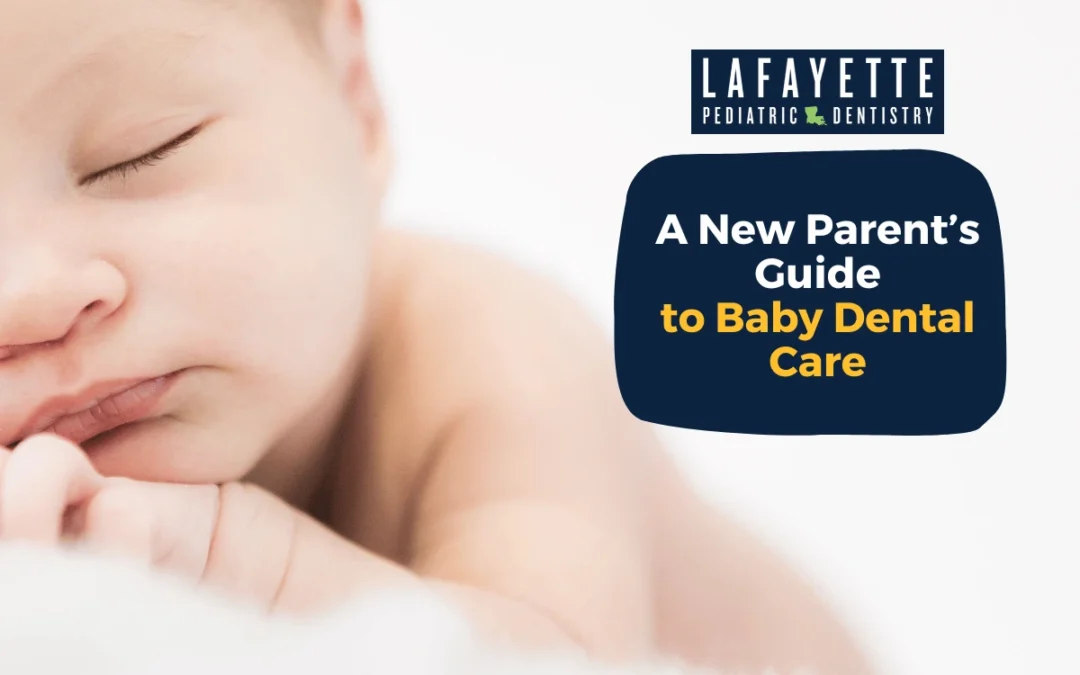“Why doesn’t anyone tell you these things before you have a baby?!” That’s something we hear from new parents all the time in our office.
If this is your first child, it’s completely normal to feel overwhelmed, confused, and unsure about so many things, including your baby’s dental health.
The amount of information (and opinions!) thrown at new parents can be downright dizzying.
Between midnight Google searches and well-meaning advice from relatives, it’s hard to know what’s actually important.
We understand that feeling, and that’s why we put together this simple guide covering some common things new parents should know about their child’s dental health.
Proper Latching When Breast or Bottle Feeding Matters
This is something that most new moms might not think much about. After all, feeding is feeding, right? Not quite!
It doesn’t matter whether it’s breastfeeding or bottle feeding, a good latch is important as it helps your baby grow well and build strong mouth muscles.
Proper latching encourages them to use their tongue, jaw and facial muscles in ways that support healthy oral development.
So, how do you know if your baby is having trouble latching? If your little one never seems to settle during feedings, has milk all over their face after eating, or spits up frequently, those could be signs they’re struggling with latching. You can read about these signs in more detail in our blog here.
If you notice these signs often, please reach out to your pediatrician or pediatric dentist for an evaluation.
One common issue that we see when a baby has trouble latching is tongue tie, a condition where the tissue connecting the tongue to the floor of the mouth is too tight and restricts tongue movement.
Read more: Tongue-Tie in Infants and Young Children: Signs to Look Out For
Wipe Your Baby’s Gums After Feeding, Even Before Teeth Come In
Trust us on this one: starting early does matter! Wiping down your baby’s gums gently with a clean, wet cloth after feeding, even before their first tooth pops out, serves multiple purposes.
It helps remove milk buildup that can breed bacteria, and it also gets your baby used to the idea of having their mouth cleaned.
By the time those teeth do start coming in, your baby will already be somewhat familiar to the sensation, which makes transitioning to actual toothbrushing so much easier down the road.
Sharing Food Utensils and Kissing Can Spread Bacteria to Your Baby
It’s second nature to kiss your baby on the mouth or use their spoon to taste their food or cool it down. These are things parents do without even thinking!
But what a lot of parents don’t realize is that the bacteria that cause cavities can actually be passed from parent to child through saliva.
If you have any untreated cavities yourself, those cavity-causing bacteria can easily spread to your baby’s mouth.
This doesn’t mean you have to stop kissing your baby! Just be mindful that your own oral health has a direct impact on theirs.
Staying on top of your dental checkups and keeping your mouth healthy is actually a big part of caring for your baby’s teeth, even before they have any!
Teeth Don’t Always Follow the Timeline
Your baby is 2 months old, constantly chewing on their hands and drooling like crazy. Must be teething, right? Then a month passes… two months… and still no teeth! You might start to panic.
It’s totally normal for babies’ teeth to come in at different rates. Even if you’re seeing all the classic teething signs, that first tooth might still be months away!
Some babies get their first tooth as early as 4 months, while others might not get one until after their first birthday.
The most important thing isn’t when those teeth come in, but that you bring your baby to see a dentist by their first birthday.
This “first dental home” visit helps build a relationship with your dental provider and gives you personalized guidance for your child’s specific needs.
Read more: Understanding Your Child’s Irregular Tooth Growth: Advice from Our Dental Experts
No Milk in the Bedtime Bottle
Here’s a big one that can save you a lot of stress later: don’t put milk in your baby’s bedtime bottle.
When your baby falls asleep with milk in their mouth, it can pool around their teeth and gums. The natural sugars in milk feed bacteria that produce acid, which then attack those tiny teeth for hours while your baby sleeps.
This can lead to what we dentists call “baby bottle tooth decay,” and it can spread quickly across multiple teeth.
If your baby needs a bottle before bed, stick with water. If milk is part of your bedtime routine, try to give it before brushing or wiping their gums, and then offer water afterwards if needed.
It might take a little adjustment if they’re used to milk, but it’s well worth it for protecting those precious baby teeth!
Being a new parent comes with so many challenges, and we want you to know that our Lafayette-based pediatric dental team is here to support families in the Acadiana area as they navigate all the questions and curveballs that come with their baby’s dental health.
Our team specializes in working with children of all ages, from newborns to teens, and we offer services specifically tailored to babies, including pediatric airway, speech, and feeding evaluations, plus preventive care like oral hygiene guidance and dietary reviews to help set your little one up for success.
Remember, it’s never too early to start good dental habits. Your baby’s smile is worth protecting from day one.
Have questions about your baby’s dental development? We’re always here to help guide you through this exciting time! Give us a call anytime or book your child’s appointment online with us!
